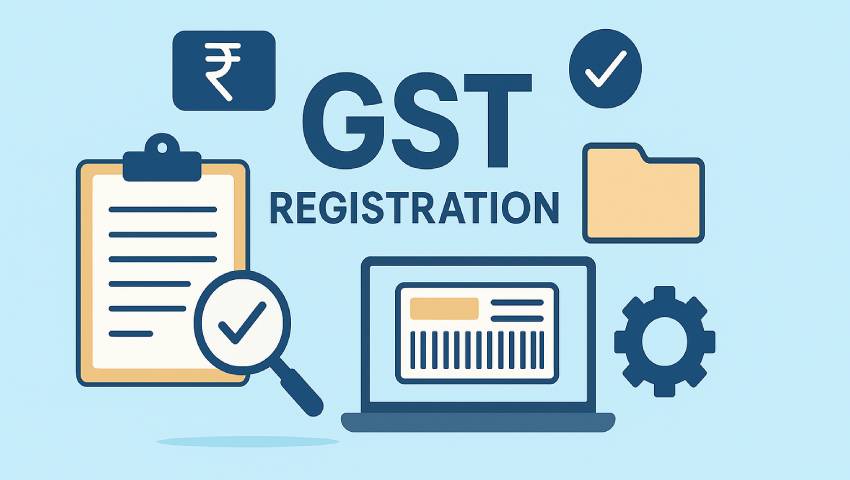
- 27/11/2025
- MyFinanceGyan
- 372 Views
- 3 Likes
- Company Law, GST
Rule 14A and the New 3-Day GST Registration System: A Complete Updated Guide (2025)
In a major step towards improving ease of doing business in India, the Government introduced Rule 14A under the GST rules. This new provision enables eligible taxpayers to obtain GST registration in just 3 days through an automated verification system.
Earlier, the GST registration process often took 7–14 days due to physical verification, officer intervention, and document scrutiny. Many startups and small businesses faced delays, which affected invoicing, vendor onboarding, and compliance timelines. With the introduction of Rule 14A, the system aims to replace manual delays with technology-driven checks, Aadhaar authentication, and AI-supported risk assessment. This ensures faster approvals while keeping fraud prevention under control.
At My Finance Gyan, we regularly track and explain the latest GST changes. As per the newest updates, the 3-day approval mechanism is now one of the most important improvements in the journey of GST registration online in India.
Who Is Eligible for the 3-Day GST Registration System?
Not all applicants automatically qualify for the fast-track approval. Rule 14A specifies clear eligibility conditions to prevent misuse:
Eligible Categories:
- Individuals and businesses completing Aadhaar authentication successfully.
- Applicants with clean compliance history—meaning they have no past cases of bogus billing, fake ITC claims, or cancelled GSTINs.
- Businesses applying for regular GST registration in India, including:
- Proprietorships
- Partnership Firms
- Companies
- LLPs
- Startups and new businesses
- Applicants whose business premises fall under low-risk zones, as classified by the GST system.
Not Eligible for 3-Day Approval:
These applicants may require detailed verification (7–30 days):
- Those who skip Aadhaar authentication
- High-risk categories based on past data analytics
- Applicants with suspicious transaction patterns
- Businesses in sectors flagged for fraud risks
- Applicants with mismatching documents
If flagged, the department may require site verification or additional documents before granting GST registration.
How Rule 14A Works: Key Features and Requirements?
Rule 14A introduces an AI + Aadhaar + PAN–linked intelligent verification system. Here are the major highlights:
Automated Application Scrutiny:
The system performs digital checks using:
- PAN database
- Aadhaar database
- Income Tax records
- MCA details (for companies/LLPs)
- Past GST records
- Geotagging and address analytics
Aadhaar Authentication Becomes Crucial:
Rule 14A clearly states that GST registration in 3 days is possible only if Aadhaar authentication is completed within the application window.
Risk-Based Approval Model:
Applicants are classified into low, medium, and high risk categories. Low-risk applicants get instant digital clearance.
3-Day Time Limit for Approval:
If no notice is issued within 3 working days, the system auto-approves the GST registration.
Notice Issuance in Case of Doubts:
If the officer has queries, a notice (GST REG-03) is issued and the applicant has to respond within 7 days.
No Physical Verification for Verified Applicants:
Rule 14A reduces physical site inspections. They are only done for:
- High-risk categories
- Applicants failing Aadhaar verification
- Inconsistent address details
Secure, Transparent, and Faster:
This reform significantly improves the GST registration process and reduces corruption or manual manipulation.
Aadhaar Authentication & Automated Verification Process:
Aadhaar authentication is now the core requirement for fast-track GST registration online.
Here’s how verification works:
Step 1: Aadhaar OTP Authentication
The applicant receives an OTP on the Aadhaar-linked mobile number.
Step 2: Biometric if Required
In some states, biometric Aadhaar authentication at a facilitation centre may be required for additional security.
Step 3: System Cross-Checks Details
The system matches:
- Aadhaar name vs. PAN name
- Date of birth
- Address consistency
- DigiLocker documents
- MCA records for companies
Step 4: Automated Risk Compilation
GSTN’s backend AI checks whether the applicant is from:
- A high-risk PIN code
- A high-risk financial behaviour zone
- A flagged business category
Step 5: Approval in 3 Days
If everything matches and there are no risks, the GST portal auto-approves the registration.
This digital-first approach ensures accuracy, speed, and reduced paperwork.
Step-by-Step Process to Get GST Registration in 3 Days:
Below is the updated 2025 process to apply for GST registration in India under Rule 14A:
Step 1: Prepare Required Documents
Keep these ready:
- PAN of the applicant
- Aadhaar
- Business address proof
- Bank account proof
- Business ownership documents
- Photo of proprietor/partners/directors
Step 2: Visit the GST Portal
Go to www.gst.gov.in → Services → Registration → New Registration.
Step 3: Enter Basic Details
Provide:
- Legal name
- PAN
- Mobile number
- State of operation
Step 4: Complete Aadhaar Authentication
This is the most important step.
You will receive an OTP on:
- Aadhaar mobile
- Aadhaar email
Authenticate both.
Step 5: Fill Application Form GST REG-01
Add:
- Business address
- Proof of business
- Additional place of business
- Bank details
- Nature of business
- Consent letter / rent agreement
- Photographs
Step 6: Submit Application
Once you submit, the system performs:
- PAN verification
- Aadhaar verification
- Address geotag checks
- Bank account validation via NPCI
- Risk profiling
Step 7: Get GST Registration in 3 Days
If Aadhaar authentication is successful and no risk is found, the registration is approved within 3 working days.
If Notice is Issued. You must:
- Reply to REG-03 notice
- Upload additional documents
- Clarify discrepancies
Upon satisfactory reply, GSTIN is issued.
Benefits, Limitations & Important Points to Remember:
Benefits of the 3-Day GST Registration System
- Faster Onboarding for Startups – Startups can quickly begin issuing invoices and doing business legally.
- Reduced Manual Verification- Less dependency on officers means fewer delays and smoother processing.
- Improved Ease of Doing Business – India’s ranking and business climate improve with faster processes.
- Fraud Prevention Through AI –AI-driven risk checks help block fake ITC scams and bogus billing networks.
- No Need for Physical Verification- Only risky or suspicious applications require site visits.
- Transparent and Time-Bound System- Auto-approval after 3 days ensures fairness.
- Helps MSMEs Begin Operations Quickly –This is a major support for small traders and new entrepreneurs.
Limitations of Rule 14A:
- Applicants who skip Aadhaar authentication will not get 3-day approval.
- High-risk categories may undergo additional verification.
- Site verification may still be required in doubtful cases.
- Mismatched documents lead to notices and delays.
Important Points to Remember (Latest Updates):
- Always ensure Aadhaar and PAN details match before applying.
- Upload clear documents to avoid REG-03 notices.
- Keep the rent agreement and utility bill updated if applying on a rental property.
- Bank account must be in the legal name of the business.
- Respond quickly to notices to avoid rejection.
This ensures a smooth and quick GST registration experience.
Conclusion: A Major Boost for Small & Medium Businesses
The introduction of Rule 14A and the 3-day GST registration system marks one of the biggest improvements in India’s taxation framework. With technology-led verification, simplified compliance, and reduced manual intervention, the government is clearly pushing for faster, easier, and more transparent GST registration online.
For startups, MSMEs, freelancers, traders, and new entrepreneurs, this reform removes unnecessary waiting time and allows quicker business operations. As the GST system continues to upgrade, tools like AI-based verification, Aadhaar authentication, and automated scrutiny will make the GST registration process even smoother. At My Finance Gyan, we will keep offering the latest GST updates, government changes, and compliance tips to help you stay ahead.
Need Help With GST Registration or Legal Compliance?
If you need expert assistance, filings, registration, notices, or GST consultancy, Choose the Best GST Registration Consultant in Pune – Startup Portal Business Services. Your trusted partner for GST, business registration, legal filings & compliance.



